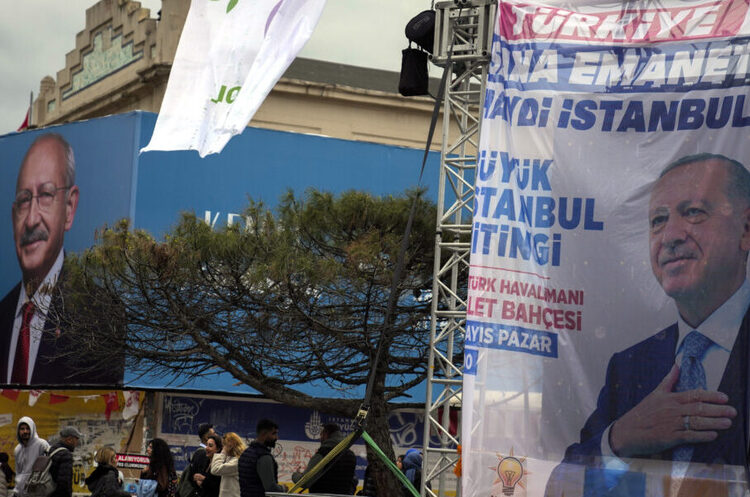'Democracy Festival' in Turkey: Erdoğan and Kılıçdaroğlu Advance to the Second Round of Elections
The President of Turkey received less than 50% of the votes and risks losing power after the upcoming voting on May 28

On Sunday, May 14, general elections were held in Turkey. President Recep Tayyip Erdoğan failed to secure the necessary 50% of the votes to win in the first round and referred to the outcome as a "festival of democracy." Commentators see great irony in the fact that these election results simultaneously provided a reason to celebrate for the Turkish opposition, moscow, and Kyiv.
According to the final tally of 100% of the ballots, the 69-year-old incumbent head of state, Recep Erdoğan, received 49.35% of the votes, while his main opponent, 74-year-old Kemal Kılıçdaroğlu, garnered 44.99%. The third candidate, 55-year-old Sinan Oğan, garnered the support of 5.2% of voters, and with their help, he may tip the scales in favour of Kılıçdaroğlu in the second round.
The opposition hopes that the further struggle for the presidency will follow the scenario of the landmark 2019 Istanbul mayoral elections, where in the second round, the opposition candidate snatched victory from the hands of the ruling candidate. In case of Kemal Kılıçdaroğlu's victory, Ankara would move closer to the European Union and drift further away from russia, while Turkish society would shift its developmental course from Islamist to secular.
Mobilisation of Kılıçdaroğlu's electorate
Kemal Kılıçdaroğlu, the candidate from the alliance of six opposition parties, accused the incumbent president of manipulation during the counting and publication of election results. To prepare the public for Erdoğan's victory, the Turkish government deliberately slowed down the vote count in major cities and accelerated it in districts with pro-government voters.
Therefore, after the processing of the first 10% of votes, Erdoğan was leading with 58.34%, while Kılıçdaroğlu had only 35.84%. However, as data from the remaining polling stations arrived, the opposition candidate began to 'catch up' with the current president and ultimately forced the competition into the second round, which is meant to inspire his supporters.
"We will definitely win the second round… and bring democracy," promised Kemal Kılıçdaroğlu, who claims that Erdoğan has lost the trust of the nation, and therefore, they now demand change.
According to his opponent, Recep Erdoğan's authoritarianism has led to an economic crisis and increased the cost of living in Turkey. The country's official inflation rate stands at 43.7%, and rental and property prices in Ankara and Istanbul have increased by more than 140% in one year.
As reported by Mind, three months before the elections in February 2023, devastating earthquakes occurred in southeastern Turkey, causing multi-story buildings to collapse like card houses. The catastrophe claimed the lives of 50,000 people. It undermined Erdoğan's popularity, as he came to power after the 1999 earthquake promising to ensure the safety of citizens through strict control over construction.
Mobilisation of Erdoğan's electorate
On the eve of the elections, Recep Erdoğan sought to appeal to the hearts of conservative and religious Turks. He referred to 72-year-old Kemal Kılıçdaroğlu as a "drunkard" and accused him of supporting Kurdish terrorists and the LGBT community.
Erdoğan also emphasised that his opponent would not be able to effectively govern the country with the support of six fragmented opposition parties.
This argument gained more weight after the elections on May 14, in which the president maintained dominant control over Turkey's 600-seat parliament. Kemal Kılıçdaroğlu's political alliance received only 35% of the votes, while Recep Erdoğan's ruling two-party coalition garnered 49.4% and can count on the support of a pro-Kurdish political force that entered the parliament with 10.5%.
"The results of these elections are not finalised yet. But nothing will change the fact that the nation has chosen us," Erdoğan stated.
Recep Erdoğan has held the position of President of Turkey since 2014, previously serving as Prime Minister for over 10 years. During his lengthy rule, he has repeatedly faced criticism for his desire to employ his supporters throughout the entire power vertical, from ministerial positions to roles of ordinary police officers, lawyers, and journalists, causing dissatisfaction among many.
The lesser the evil, the one they choose
Now, according to economist Timothy Ash, who focuses on studying Ukraine, russia, and Turkey, the electorate of the 85-million country, which is a NATO member, is faced with choosing the lesser of two evils – the "devil they know" in the form of Erdoğan, or an untested broad coalition that could easily fall apart after the elections.
"The great irony is that likely both moscow and Kyiv are celebrating this election result: moscow, as they think Erdoğan weakens NATO; Kyiv as they think Erdoğan is the best guarantor that Bayraktar drones and munitions from Turkey keep flowing," wrote Timothy Ash.
If you have read this article to the end, we hope that means it was useful for you.
We work to ensure that our journalistic and analytical work is of high quality, and we strive to perform it as competently as possible. This also requires financial independence. Support us for only UAH 196 per month.
Become a Mind subscriber for just USD 5 per month and support the development of independent business journalism!
You can unsubscribe at any time in your LIQPAY account or by sending us an email: [email protected]


